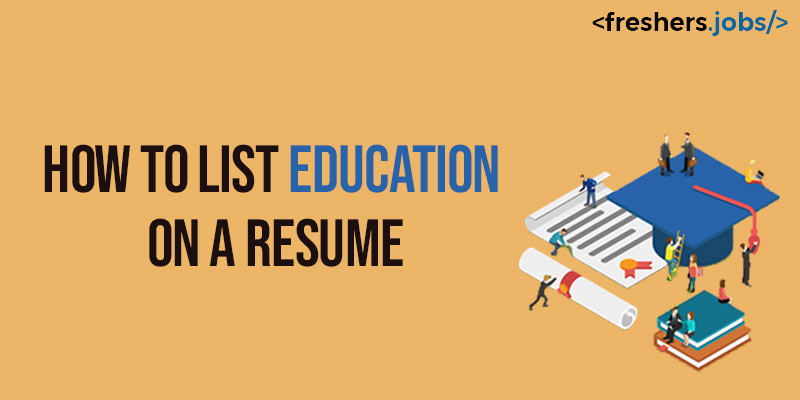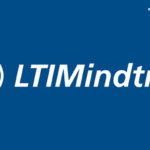The academic section of your resume gives recruiters a thorough understanding of your background and how it applies to the freshers jobs. Your education area may set you apart from other applicants if tailored to the job’s criteria. Your job and educational qualifications will determine the best way to list your education.
There are various formats for mentioning education on a resume. The ideal location and level of qualifications to provide when applying for a job can be determined by reading and comprehending the job description. You can examine the jobs alert to see what the recruiters are searching for as not all jobs require your complete credentials. Learn how to put your education on a resume in this blog.
One of the few essential categories on resumes that companies check for is education. This information will provide interviewers with a better understanding of your background, which can help them decide whether you are a suitable candidate for the job. This area could help you stand out from other applicants immediately if your education is pertinent to the job or includes any certificates needed for the role. As freshers, you can start your job hunt from freshers jobs in Hyderabad.
The Information to include in the educational details in resume.
When reviewing your education section, recruiters are seeking a few fundamental types of information, including:
- What is your school’s name?
- The address of your school
- The qualification you hold (if applicable)
- What you studied
- Year of graduation (if applicable)
- Your grade point average
- Any honours, academic recognition, coursework, hobbies, or other achievements you have made while pursuing your degree that is pertinent
- Although different jobs call for different amounts of detail, the education part of a resume is frequently the shortest-aim for 15 to 30 words.
How to write education in resume? It’s essential to format your educational background in accordance with the requirements of the job you are applying for. For example, a recent graduate will want to provide more information and emphasize the education part of their resume since it comprises most of their experience.
The interviewers will be more interested in the work that candidates have done at prior companies, thus someone who has been in the workplace for some time will lower their education section below their professional experience and make this area concise. You can know how to list your certifications in your resume.
What Recruiters look for in a Resume’s Education Section
Companies look for many elements in your education, and what they seek varies depending on the job requirements. The recruiter may want to see that you have a high school diploma or a college degree if you are looking for an entry-level position.
Reading the job description thoroughly will help you determine whether your background is a good fit. The educational requirements of a position are frequently included under a requirements or education section.
How to write educational qualifications? Specific qualifications or degrees are required to work in various industries, such as banking or healthcare. Place your education near the top of the page, just below your contact information and professional summary, if you know a recruiter will need to view your qualifications before considering your other experience.
Honesty should be your top priority when mentioning your educational experiences. Prior to making an opportunity to get a job, prospective employers could run a background check. Your chances of landing the job may suffer if they discover information that differs from what’s on your CV.
How to make a List of your Education
Recently Graduated (1-5 years)
Place your education section before or on a level with your work experience if you just received your diploma for education description in resume. Use a few of the preparation tips to include your education. Make this the first section that recruiters will see because your education is probably the most noticeable component of your resume. You can also list your dates of attendance, any awards you have received, and your GPA if it’s higher than 3.4. Include the most prominent qualification where you were most active if you attended more than one.
Experienced Professional (5 or more years)
Move the education part below your professional experience if you have been working for a while. Your current achievements will be of greater importance to your interviewers than your academic background. If you’d like, you can also remove additional particular information from your education area, such as attendance dates and GPA. The more interest you can generate around your professional background, the better. Include any advanced degrees you have, such as a master’s or doctorate, in descending order of level (e.g., PhD, master’s, bachelor’s, etc.). You Must know the best skills to include in a resume.
How to List Education that is still Incomplete or Unfinished
Ongoing Education
You can still mention the educational details in resume and the work you have done and the date you intend to graduate if your degree is not yet complete. Recruiters are curious about your degree of study and any relevant coursework. If you are still in college, list your college after your contact details and summary statement. You can know How to Write a Cover Letter for a Resume?
Include the following details, if possible:
- Name of the institution
- Degree level
- Planned graduation year
If relevant, think about including the following optional data:
- Honours or further achievements
- If your GPA is 3.4 or higher,
- Relevant academic work
- Organisations or activities which are extracurricular
Incomplete Education
How to write education in resume? You can put any completed coursework in your education area even if you have an unfinished education. By adding credentials or other professional development achievements, you may improve the area. You could even consider including a professional development section that shows your commitment to on-the-job learning. If this is directly relevant to the experiences you will have at work, it is frequently just as beneficial to recruiters. If you are a new joiner know the benefits of On the job training.
There are a few options available to you when it comes to what to put in the education area of your resume, where to put it, and how to make it look good to recruiters. Consider where you are in your career and what you want to stress when placing information on your resume. Place education toward the top of the list if it dominates your experience. You might wish to put education underneath experience if you have a lot of experience.
Be sincere and consider when choosing your content. Include significant portions of your continuous education that are appropriate for the job. This can include academic work, diplomas, awards, affiliations, and more.
Prepare to discuss your background in an interview. Be ready to respond to this and any other follow-up questions they may have regarding your qualifications. Your interviewer may ask you to explain or provide more detail on the educational experiences you’ve listed. Know the common HR Interview questions.
Conclusion
I hope you have got from the blog how to list education on a resume. Keeping your education qualification section genuine and relevant is the best method to make it stand out. Only include academic accomplishments that will increase your probability of a job and earn a high freshers salary. Be clever and place your credentials in a place that will catch the recruiting manager’s eye.




